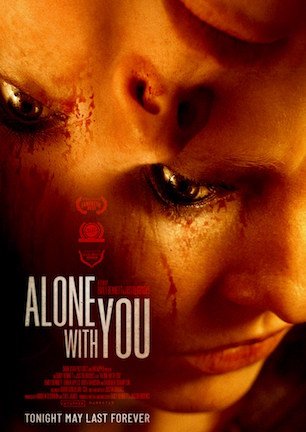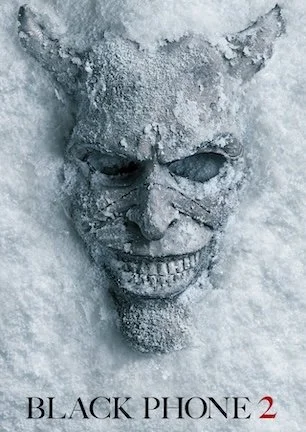Studio: Dark Star Pictures
Director: Emily Bennett, Justin Brooks
Writer: Emily Bennett, Justin Brooks
Producer: Emily Bennett, Justin Brooks, Andrew D. Corkin, Theo James
Stars: Emily Bennett, Emma Myles, Dora Madison, Barbara Crampton
Review Score:
Summary:
An insecure woman experiences a terrifying psychological breakdown while inexplicably trapped inside her apartment.
Review:
Critics and editors have a bad habit of summarizing film reviews with headlines formed around the word “is.” How many times have you seen a tired take like, “(Horror Anthology) is a mixed bag that doesn’t bring anything new to the table.” Or, “(Action Movie) is a nonstop thrill-ride that’ll have you on the edge of your seat.” How about, “(Arthouse indie) is a tour-de-force fever dream of nightmare fuel certain to become a cult classic.”
When I noticed one genre website in particular doing this on nine out of every ten posts, a silent alarm went off in my head whenever “is” entered into my own reviews. What I eventually came to realize is that, beyond being reductive, “is” isn’t so much a tool for useful insight as it is an often observational declaration. In other words, if a critic gets hung up on using “is” too much, the review risks being simply descriptive rather than deeply analytical.
Since I wanted to be more creative with my critiques, I started consciously trying to avoid “is” statements whenever possible, specifically so summary sentences didn’t sound as stale as everyone else’s. That desire presents a problem with productions like “Alone with You” however.
“Alone with You” didn’t click with me. I recognized within the first half hour that the one woman, single location setup was progressing too patiently to spin up to my speed. The psychological spiral slowly tearing that woman apart gets more conceptually interesting toward the end as frantic editing and frightening imagery amps up to mirror her mental breakdown. But even though I could relate to themes of claustrophobic isolation and the danger of attaching self-identity to an unhealthy romance, I never had a drive to invest in the character, her arc, or its outcome.
Knowing “Alone with You” is a homegrown project made by a small handful of young filmmakers, it didn’t feel right to pour out eight paragraphs of negativity just to say, “I didn’t like it.” My challenge then, is to write a review that gives you enough information to gauge what you might think of the film independent of my opinion. And, well, I can’t see a more direct way to do that than by writing a bunch of “is” sentences that describe the style of experience “Alone with You” provides.
“Alone with You” is a character study/chamber drama where a troubled woman emotionally unravels while inexplicably trapped inside her Brooklyn apartment. Coming at her from all angles as the lead actor, co-writer, and co-director, Emily Bennett has the protagonist’s personality down pat. Charlie is a person everyone has met, maybe even has been at some point in time. Raised by a devoutly Catholic mother who books regular guilt trips regarding her sexuality and poor career choices, Charlie has been conditioned to be apologetic. Insecurity inspires nervous laughter that accompanies each unnecessary “I’m sorry,” as though she feels silly by burdening someone with an ordinary request for an essential need. She’s past the point of coming-of-age, but still immature enough that she chooses to not see the red flags with her girlfriend Simone, preferring to instead invest in a problematic person that’s just one more uncontrollable element destined to disappoint her.
While waiting for Simone to come home, this desperately clingy woman experiences flashbacks and visions that constantly chip at the idyllic impression of a counterfeit relationship Charlie imagined in her head. A voice from a vent and a shadowy figure glimpsed in the background become two other entities who cause Charlie to question the loosening grip on her sanity. Unable to open her front door or see past the inky darkness outside the window, Charlie’s reality goes from blandly basic to tragically bleak when she realizes she’s in an inescapable nightmare with no idea how she got in, or how to get out.
It’s easy to see how “Alone with You” attracted interest from notable film festivals including Grimmfest and Fantastic Fest. Given the world’s collective experience with COVID-19, there’s a timeliness in the film’s focus on feeling helplessly trapped that falls in step with quarantine-related terror. A glib “it’s like” could call “Alone with You” an inverse Bo Burnham’s “Inside,” if that comedy special’s introspective commentary had taken a darker turn into “descent into madness” territory.
It’s a little tougher to imagine what the “right” audience is for this film. “Alone with You” is set in a small corner of New York best categorized as a millennial bohemia, and is populated by the club-going socialites and starving artists one would expect to find there. You should know enough by now to see “Alone with You” isn’t a “Halloween Kills” (review here) kind of horror movie. It’s a dreamy mood piece whose visual essays on toxic partnerships and self-denial are open to interpretation. “Alone with You” doesn’t possess the scope to make a big splash, although its ambiguity will still intrigue some to dig into “ending explained” theories in an effort to make sense of the metaphors.
“Alone with You” is a 50/50 movie if ever there was one. It’s not divisive in a manner like “Malignant” (review here), where reactions are so extreme they either love it or hate it with nothing in between. But individual mileage will absolutely vary as the subdued psych-thriller tone and DTV texture will either hit your slow-burn sweet spot or merely lull you into a yawn.
Review Score: 50






“Dust Bunny” tries its best to be gateway horror, but extended stretches of silence repeatedly followed by slow buildups really tax the tempo.